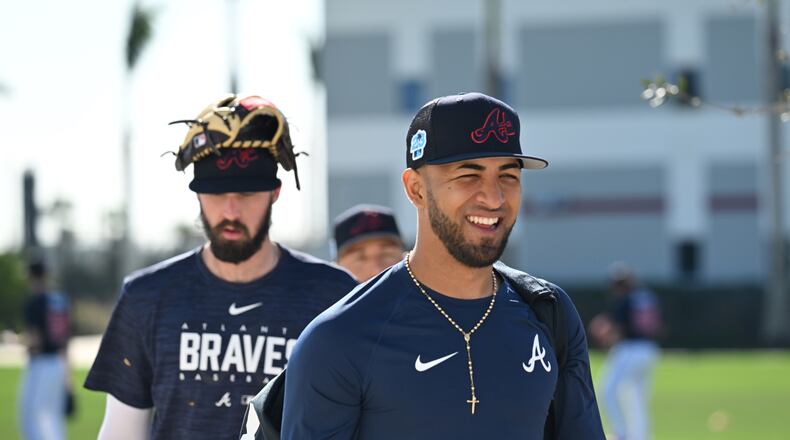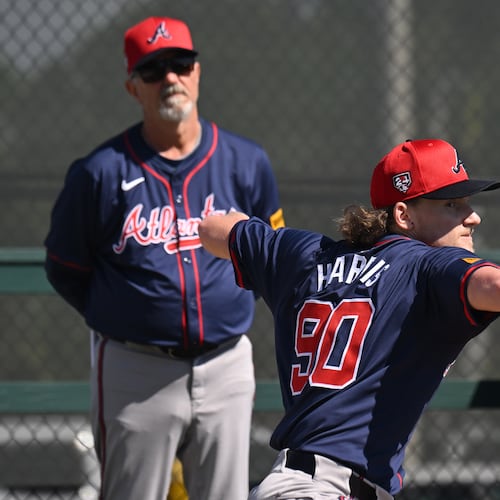NORTH PORT, Fla. — Having too many players can be a good problem for an organization.
Unless, of course, none of them are viable options.
Luckily for the Braves, their outfield situation seems to be good depth. They brought in a group of outfielders to compete for roster spots, and all have seemed promising.
“This is probably the most speed – (bench coach) Walt (Weiss) and I were talking about this the other day – that we’ve ever had in camp, and athleticism,” Braves manager Brian Snitker said before a spring game. “All the guys that (Braves president of baseball operations) Alex (Anthopoulos) brought in, they’re athletic guys that can play all over the outfield, and they throw, they run, and they’re good defenders.
“Probably for most of them, they just haven’t put that offensive side together because the talent level and skill set in all these guys is really, really good. Kudos to (Anthopoulos) for identifying that, and we got a nice cache of outfielders right now.”
Anthopoulos traded for Sam Hilliard in the first trade of the MLB offseason.
He signed Jordan Luplow in December.
He brought in Eli White a couple weeks later.
A few weeks before spring training, he signed Kevin Pillar.
Entering camp, the situation was clear: Ronald Acuña Jr. would start in right field, Michael Harris in center field and Eddie Rosario in left field. But with Rosario coming off a rough season, other outfielders might have the opportunity to battle for significant playing time in left field.
As it turns out, Rosario has seemingly started returning to form. “I’m back,” he told The Atlanta Journal-Constitution in an interview earlier this month. He homered twice in the World Baseball Classic. He’ll be the starting left fielder.
Most important: The vision issues are behind him.
“You can’t do too much (when you can’t see),” Rosario said earlier this spring. “It’s tough to (see a) fly ball, it’s tough to recognize the pitch when it’s coming. Now everybody throws hard and throws sliders, and last year I lost (the ball). The ball is coming, I (would) lose the ball. It’s tough, man.”
Now?
“I feel more comfortable,” Rosario said. “I feel more happy. It’s more easy to play the game, and you can do what you want every day.”
But what about the backup outfielders? They could earn starts, depending on how Rosario plays.
It seems Hilliard and Pillar will make the opening-day roster.
Hilliard is out of minor-league options and has played well this spring. Pillar is an Article XX(B) free agent, which in simple terms means he could opt out of his minor-league deal and sign elsewhere if the Braves didn’t put him on their opening-day roster.
Pillar signed with the Dodgers for last season knowing he might never make it up to the bigs – he wanted to learn from their organization. He made it to the majors, but injuries derailed his season a few games into his major-league stint. But he chose the Dodgers because of what they could teach him and feels like he learned a lot.
In an interview at the beginning of spring training, Pillar told the AJC he’s at peace with how his career has gone.
“I wanted to be a superstar. That never happened,” Pillar said. “But I always tell people there’s nothing wrong with being a good big-league baseball player. It pays well, you can do it for a long time, you earn the respect of your teammates and the fans that watch this game.
“Constantly always striving to be the best player I can be. Still feel like I could be an All-Star if everything clicks, but at the end of the day, I do enjoy being a guy that plays the game the right way, that his organization and teammates value.”
The Braves optioned White and Luplow. White played well in big-league camp. Luplow reported with an oblique strain, which put him behind the others. He’ll keep getting at-bats and get hot to put himself in a position to be brought up after the regular season begins.
Luplow seemed to be in a positive mental space this spring. In previous years, he has made the mistake of looking too far ahead. Nowadays, he tries to remain grateful for the current day.
“It was one of those things where I just beat myself up so much, where if I’m going bad, it was just, like, the end of the world,” Luplow said before Atlanta optioned him. “It was just like, ‘I can’t believe I put in all this work, I’ve done all this. I should be getting results.’ It’s not always the case, and so it’s like, I’ve put myself through that situation and it didn’t come out good, either – any time I’ve done it.
“So it’s like, ‘Am I just gonna keep doing that, and feeling bad and down and feeling like I’m scratching and clawing to get back, or should I just go try and make the best day that day?’”
White has experienced minor-league success, but it hasn’t translated consistently to the bigs. Someday, he will be the outfielder who’s out of minor-league options and will benefit because of it. For now, he’ll begin the year in Triple-A and try to continue applying the offensive tweaks he made over the offseason.
White might have the talent to one day have a breakout season.
“He’s got it in him, for sure,” said Sean Murphy, the new Braves catcher who used to be roommates with White when the two played in Oakland’s system. “I know the type of game he brings to the table. He’s so fast, so aggressive on the bases, plays great defense. He hits better than most people expect. He’s got some power in there.”
Baseball teams need depth because a season is long. Injuries occur. Players underperform.
It’s impossible to predict what might happen over 162 games.
“I really liked that outfield depth that we’ve created all of a sudden, with guys that have been here,” Snitker recently said. “It’s just really good.”
About the Author
Keep Reading
The Latest
Featured



